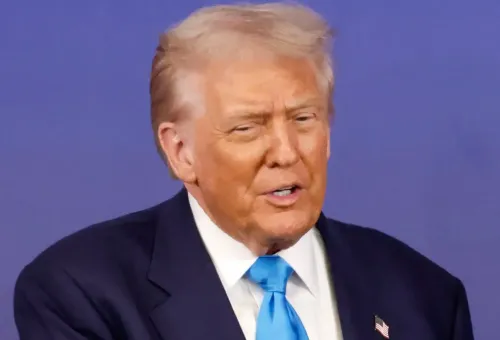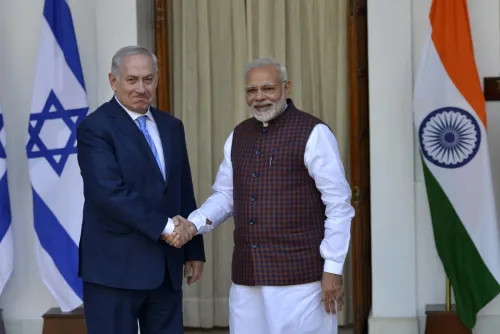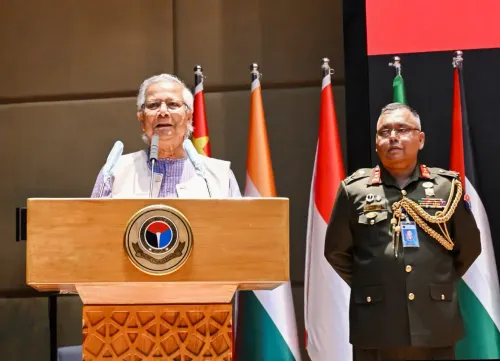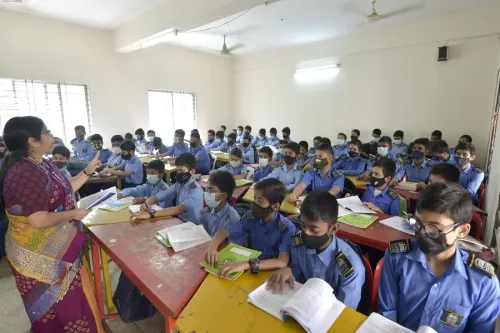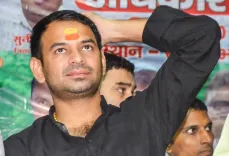Is Asim Munir’s Power Seizure a Reflection of Pakistan’s Failing State?
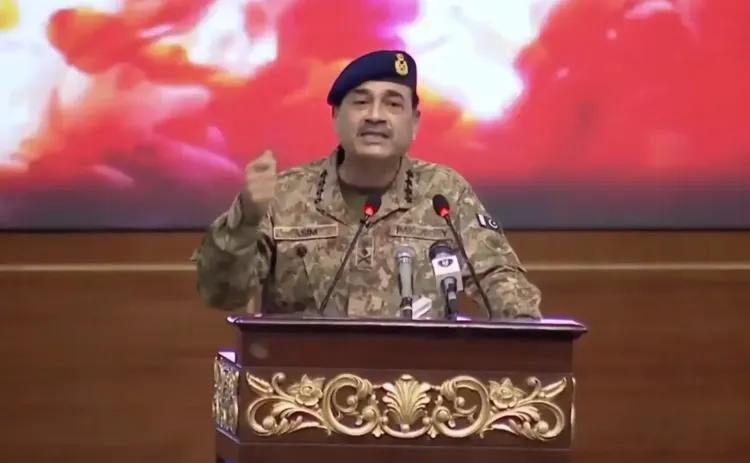
Synopsis
Key Takeaways
- Asim Munir's rise marks a significant shift towards military dominance.
- The judiciary's independence is severely compromised.
- Historical patterns of military rule suggest potential economic decline.
- Societal dissent is increasingly stifled under military-backed governance.
- Pakistan's democracy faces an uncertain future.
New Delhi, Nov 25 (NationPress) The latest constitutional upheaval in Pakistan has once again highlighted the emptiness of its purported democracy. This time, however, the drama did not involve tanks parading down Constitution Avenue or generals declaring martial law on national television.
The nation has witnessed something far more unsettling: a meticulously orchestrated, paperwork-driven coup disguised as legitimate governance. Pakistan’s parliament, known for its subservience to the military, has stealthily reinforced the military structure that has been the country's dominant force since 1958.
At the center of this political spectacle is General Asim Munir, who has been appointed to a newly established superrole that effectively overshadows every elected body and, in practice, the Constitution itself. This development is hardly surprising for those familiar with Pakistan’s political dynamics. The Army has never genuinely relinquished control; it has merely adapted its strategies. Nonetheless, Munir’s ascendancy is remarkable for its careful packaging in constitutional rhetoric. He wields extensive authority over all military branches, enjoys legal immunity, and is shielded from judicial scrutiny.
For a country currently ranked 117 out of 140 in the World Justice Project’s Rule of Law Index, and classified by Transparency International as suffering from “deep structural corruption,” this formalization of military dominance is nothing less than disastrous.
Munir did not require troops to storm government offices, nor did he need a sensational televised coup. Instead, he capitalized on a parliament weakened by internal strife and fearful of military retribution.
Pakistan’s opposition remains disjointed, with party leaders oscillating between imprisonment and exile based on the whims of the generals. The ruling coalition, eager to gain military favor, hastily enacted amendments that centralize military authority and significantly limit judicial oversight of the military leaders. This is not a remedy; it is a coronation.
Munir’s reputation is not that of a national hero. His tenure is tainted by failures and controversies. During the May 2023 border tensions with India, internal assessments from Pakistan’s security apparatus criticized his strategies as “overconfident and strategically flawed.”
Instead of facing accountability, he was promoted—first to Army Chief and now to this constitutionally fortified position. A general who faltered in a limited conflict is now elevated above the civilians he was meant to safeguard. This is not merely ironic; it is perilous.
Pakistan's history is painfully predictable. Each time its democracy displays signs of autonomy, the military intervenes—openly in 1958, 1977, and 1999, or covertly through manipulated court rulings, political threats, and clandestine agreements in the 2000s and 2010s. Now, the Army has adopted a more sophisticated approach: legislating the coup instead of broadcasting it. The ramifications are extensive.
Firstly, the judiciary has been effectively weakened. Historically, Pakistan’s courts have oscillated between complicity and resistance, occasionally legitimizing coups (as seen in the 1958 “Doctrine of Necessity”) and at times resisting military overreach. However, with new legal protections for the military’s highest office, courts are rendered largely impotent. Any effort to contest military actions becomes a constitutional dead end.
Civil society is faring no better. Lawyers, journalists, and students have suffered from crackdowns over the years, from the 2017 forced disappearances of reporters to the arrests of activists amid the political turmoil of 2022-23.
According to Human Rights Watch, the number of enforced disappearances in Pakistan is in the “thousands,” many of which are linked to the military’s intelligence agencies—agencies that Munir himself once led.
Now, armed with legal backing, the military can act with even greater impunity, fostering a climate of fear that stifles dissent. A society where criticizing the Army is treated as a crime cannot progress intellectually or politically; it can only stagnate.
Those in Pakistan who celebrate this constitutional shift, arguing that strong military oversight will stabilize the country, are ignoring 75 years of historical evidence. Every period of military rule has culminated in economic mismanagement, international isolation, and political breakdown.
During Ayub Khan’s administration, growth was mired in vast inequality that incited unrest. Under Zia-ul-Haq, extremism and sectarian violence flourished. Musharraf’s reign began with promises of liberal reform but ended in institutional decay and the 2007 crisis. Munir’s tenure will follow a similar path.
A military that has never succeeded in ensuring long-term stability now has even fewer constraints. International repercussions are unavoidable. Pakistan’s economy is already in turmoil—inflation reached approximately 24 percent in 2023, external debt exceeded $125 billion, and the country has sought yet another IMF bailout to avert default. Investors are unlikely to inject capital into a nation where genuine authority resides with generals shielded from accountability.
Global financiers typically distrust governments overshadowed by the military, especially when there is a history of military interference in economic matters for personal gain.
Pakistan’s formidable military conglomerate, the Fauji Foundation, currently controls billions in commercial assets—from cement to fertilizers to food—making it one of the few armies globally that operates as a corporate empire. This thin veneer of legality will not reassure anyone. Aid will come with stricter conditions. Trade partners will hesitate.
Diplomatic pressure will intensify. And, as always, the burden will not rest on the generals residing in Rawalpindi’s fortified enclaves but on ordinary Pakistanis striving to survive.
For India, this is not a reassuring development. A Pakistan governed more tightly by the Army is a Pakistan that will make decisions through a singular institutional lens—reactionary, paranoid, and narrow-minded. Civilian leaders typically favor negotiation and crisis management; military leaders often prefer escalation and strategic signaling. An India seeking a stable neighbor will instead confront a Pakistan that becomes increasingly insular, insecure, and unpredictable.
This constitutional coup's tragedy is magnified by the fact that Pakistan once experienced glimpses—fragile, fleeting ones—of democratic renewal. Civilian governments sporadically reclaimed authority. Grassroots movements called for accountability. Courts occasionally asserted their independence. However, Munir’s elevation is intentionally designed to extinguish those prospects.
Once military supremacy is codified into law, it becomes significantly more challenging to contest. Munir may believe he has secured his legacy by rewriting the rules in his favor, but history has not been kind to Pakistan’s generals. From Ayub’s humiliating downfall to Yahya’s disgrace following 1971, to Musharraf’s life in exile, Pakistan’s military rulers ultimately fell, but not without inflicting lasting harm on the nation. This chapter will likely follow the same narrative.
Ultimately, Pakistan must confront a harsh reality: the Army is not the protector of the state; it is the weight that pulls it down. A country where elections change faces but not power dynamics is not a democracy. A country where criticism of the military is equated with treason cannot claim to be free. And a country where a single general can legally position himself above the political framework cannot pretend to function as a modern nation.
Pakistan may have formalized this coup, but legality does not equate to legitimacy. What has transpired is a damning indictment of the entire political system—a structure that permits one man in uniform, supported by an institution addicted to power, to override the will of millions.
History will judge Asim Munir and the Pakistan Army harshly. However, it is the people of Pakistan, already beleaguered by poverty, misgovernance, and oppression, who will bear the brunt of this outcome.

